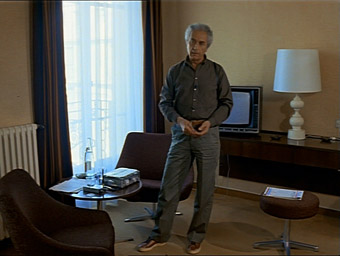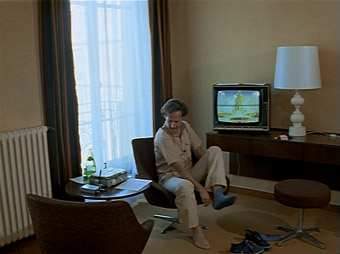|
While
attending the 1982 Cannes Film Festival, celebrated German director Wim Wenders set
up an experiment that he persuaded a number of eminent
attending filmmakers to participate in. Supplying them with
a small number of prepared questions on the present state
and possible future of cinema, he left each of them alone
in a room to deliver their responses to an unattended camera and a single, ten-minute reel of film to record their responses on.
Room
666 is the sort of film that could probably only
get made and shown (and put on DVD) because a well respected
and connected filmmaker was behind the project. Cinematically
there's little to talk about here, as apart from a couple of
cutaways and the final interview, the framing never
changes and most of the participants sit in wide shot some
distance from the camera. There is probably a small essay to be written
about the television that plays in the background as the interviews progress – one participant
pauses to watch it, another immediately switches it off,
and it occasionally seems to oddly echo the views being expressed.

It's
all about what the filmmakers have to say, of course, and
herein lies the film's appeal for cineastes. I'd even be willing to wager
that Room 666 is actually more intriguing
in retrospect than it was back in 1982, as we are able to reflect on how the views and
predictions expressed here have been both validated and contradicted
by subsequent events. There's certainly an overriding pessimism
that captures well a widespread feeling at the time, when
the arrival of the home video recorder was seen by many
as ringing a death knell for cinema, yet despite a definite
dip in audience figures and the closing of a considerable
number of screens, the communal film experience continues
to thrive. Where many of the filmmakers do have a point
lies in their views on the slow strangulation of creativity in mainstream
cinema, what Steven Spielberg identifies as (and admits
to having contributed to) an obsession with the fast return,
that all–important opening weekend that for Hollywood
has increasingly become the deciding factor in whether or
not a project gets greenlighted. It's no doubt this that prompts
Noël Simsolo to suggest that cinema is not dead but
being killed by stupid movies, and that it is not necessarily
the fault of those making the films. Monte Hellman seems to agree
and believes that good movies are largely a thing of the
past, although he admits to watching very few of those he
tapes today.
The
contributions vary in outlook and length, with Jean-Luc
Godard stretching out the full ten minutes his reel of film
lasts, while Filipino director Mike de Leon gets to make
one quick but pertinent point and is gone. Susan Seidelman
expresses the belief that movies are driven by passion and will become
lifeless without it, while Mahroun Bagdadi suggests that
this passion has perhaps disconnected some filmmakers from
the real world experience, wondering if his generation is
putting true life on screen or a version they've absorbed solely
from the movies of others. This is seconded by Spielberg,
who claims that he and his generation of filmmakers know
only how to make films and nothing else, and that if the
end of the world came they wouldn't even know how to dig
a hole to hide in.
Most
intriguing of all are the future predictions, with Ana Carolina
loftily stating that no true artist would be interested
in working with the electronic image, something Michaelangelo
Antonioni is already doing at this point and that a large number of great
filmmakers and artists have openly embraced since. It's Antonioni
who provides the most unnervingly accurate future vision,
foreseeing a time when films are watched in the home on
large screens from a high definition source such magnetic tape
or some yet to be developed technology, perhaps involving
lasers. Mind you, the always perceptive Werner Herzog gives
him a run for his money with his prediction that we will
one day be able to browse for goods and order them through a
TV or home computer. And remember, this was recorded ten
years before Tim Berners-Lee created the World Wide Web.

There
are also some sobering moments, including what was very
likely the last appearance on film of Rainer Werner Fassbinder,
who committed suicide just three weeks after being recorded here, and Wenders
leaves us with a taped contribution from Turkish director
Yilmaz Güney, who at the time was facing extradition
and was unable to leave his place of refuge. Güney
summarises the view of many of the contributors when he states that that independence
and the artist's vision is steadily being crushed by the
monetary factor, and warns that in Turkey, progressive 'blooming'
cinema "is constantly being suppressed, banned, punished,
silenced, by some dominant forces."
It
would actually be hard to recommend a film as cinematically
static as Room 666 as a must-buy to anyone
but the most dedicated cineaste were it a stand-alone disc,
at least in its UK region 2 incarnation – the version in
Anchor Bay's US box set includes a commentary that provides
additional information on the participants that is sorely
missed here. But as a component of an already fine
box set it's a most worthwhile inclusion, and though it
may not provide much to look at, it does make for often
fascinating listening.
Framed
4:3 (this was clearly a television piece), the transfer
is very good given the limitations of lighting and location.
Sharpness, colour and contrast are all fine.
Dolby
2.0 and 5.1 soundtracks are again offered as options –
both are essentially the same, with the dialogue centrally
located on 5.1, which is also slightly quieter than the
2.0. The interviews are all clear, and those not in English
have fixed subtitles.
None.
Where's the commentary?
Definitely
one for the dedicated film fans, and even some of those
may balk a little at the basic presentation. The commentary
is really missed here, as some additional information on
the interviewees would be welcome. As part of The
Wim Wenders Collection it's an interesting
one-off, and an intriguing snapshot of opinions from a specific
moment in film history.
|